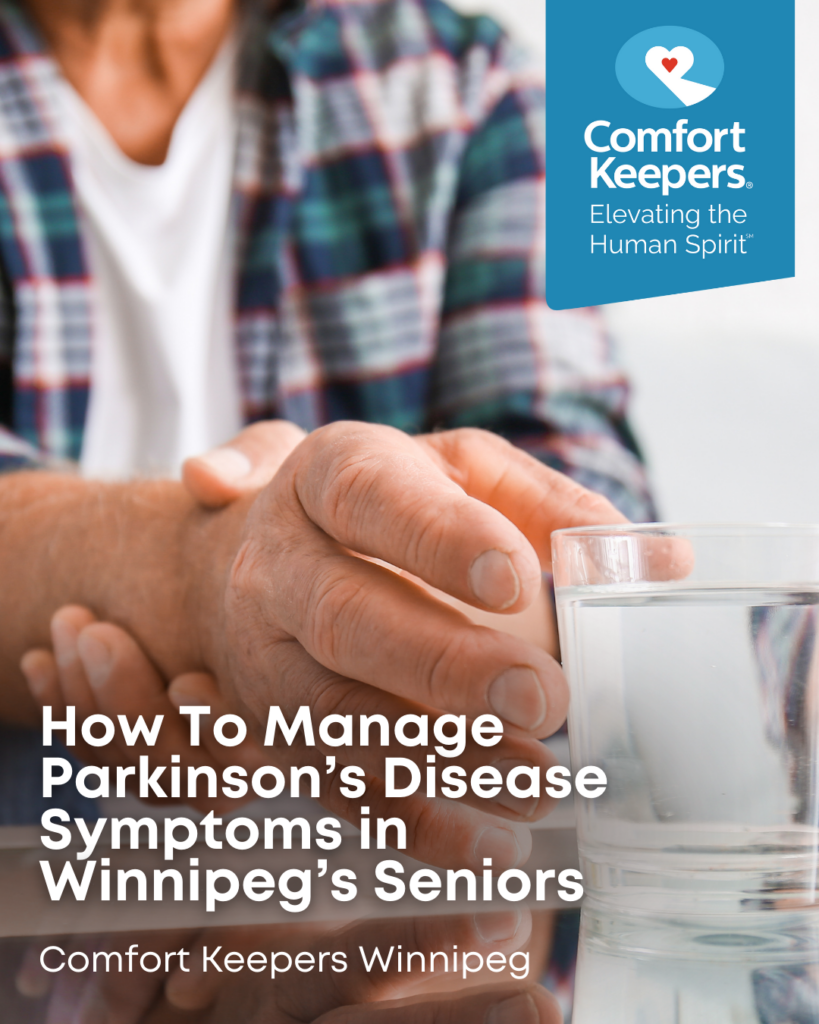How To Manage Parkinson’s Disease Symptoms in Winnipeg’s Seniors
Winnipeg Senior Home Care | April 16, 2025

What Every Family in Winnipeg, MB Needs to Know About Parkinson’s Disease
Parkinson’s Disease, a common neurodegenerative disorder, affects approximately 1 in 500 Canadians. While the disease can affect both men and women, men are at a slightly higher risk. The majority of diagnoses are in people over the age of 60, with the average age of onset being 65. The risk of developing Parkinson’s disease increases with age.
#DYK: Over 100,000 Canadians are living with Parkinson’s today and approximately 6,600 new cases of PD are diagnosed each year in Canada
While there is no known cure for Parkinson’s, taking steps to manage the disease can increase a senior’s quality of life and help to reduce the impact of symptoms.
Parkinson’s Disease Can Manifest in the Following Ways:
- Tremors
- Balance problems
- Cognitive impairment
- Mood disorders
- Short steps and slowed movement (bradykinesia)
- Speech and writing changes
Those that have been diagnosed with Parkinson’s should discuss management strategies with a healthcare professional. There are a variety of medications and therapies that a doctor can recommend.
Four Everyday Symptom Management Strategies Can Include:
#1. Finding Ways to Relieve Stress:
There is ample evidence that stress can make symptoms worse. However, they usually return to normal levels once the cause of stress is removed. Activities that can help reduce stress include meditation, yoga, deep breathing, getting outside, spending time with loved ones, participating in hobbies or physical activity approved by a physician.
#2. Maintaining a Good Diet:
For those with Parkinson’s, proper nutrition will not only help manage symptoms, but can help slow the progression of the disease in some seniors. In addition to healthy, nutritious food, it’s important to prevent dehydration too.
#3. Adapting Your Home:
Depending on the Parkinson’s symptoms that someone is experiencing, there are a variety of ways to improve everyday life with a few adjustments to living space. For those with trouble walking, or those that need a wheelchair, wide walkways help manage mobility. Mattresses with adjustable features can be helpful for anyone with difficulty getting in and out of bed, and grab bars may be helpful for those with balance issues.
#4. Preventing Falls:
Having trouble walking is a common Parkinson’s disease symptom. Minimizing fall risk is an important safety management strategy that is easy to execute. Wearing proper footwear, making sure rooms are properly lit and removing trip hazards can all help reduce the risk of falls.
Comfort Keepers® Can Help
For those who need extra help, in-home caregivers can help facilitate stress management activities, provide support for physician-approved diet and exercise plans and will evaluate a home for safety as part of an in-home assessment.
Caregivers can also help with mobility, improve home safety, provide transportation to appointments and events and can help seniors maintain positive mental health through connection, engagement, and companionship.
Comfort Keepers® Winnipeg Offers a Wide Range of Private Home Senior Care Services
For families concerned about the health and well-being of aging loved ones, we can help with home care services, including Alzheimer’s and dementia care, in-home personal care, respite care, specialized care, in-home nursing, end-of-life care, senior living transition services, and much more!
Comfort Keepers® professional caregivers provide services to ensure safety, health, and happiness without the stress of moving to an assisted living or rehabilitation facility. Individually tailored care plans account for living arrangements, medical issues, physical restrictions, personalities, expectations, and more.
Our Interactive Caregiving™ Approach Enables Top-Notch Homecare
Interactive Caregiving™ provides a system of care that addresses safety, nutrition, mind, body, and activities of daily living (ADLs). Our compassionate caregivers can provide a personalized home care plan for your loved one, allowing them to enjoy a healthier, safer, and more meaningful retirement at home.
Comfort Keepers® is the Most Trusted Name in Senior Care in Winnipeg
Our in-home caregivers ensure our seniors are physically, socially, and mentally engaged. In addition, we provide options, activities, events, and resources for seniors that might otherwise not be available.
Locally Owned and Operated In-Home Personal Care for Seniors
Our caregivers live and work in the Winnipeg area. We know the area and how to assist our clients using local resources. Comfort Keepers® Winnipeg is here to help you and your loved ones get the best care possible. If you live in Winnipeg and require homecare services for senior personal care and wellbeing, contact Comfort Keepers® at (204)-488-4600.
Accredited Home Care for Seniors in Winnipeg
Comfort Keepers® Winnipeg is accredited with Exemplary Standing with Accreditation Canada. Accreditation is an intensive process in which industry experts examine an organization’s processes, policies, and procedures against quality standards. To achieve accredited status, Comfort Keepers® offices met or exceeded the rigorous standards for Home Care companies, as defined by Accreditation Canada.
References
Mayo Clinic. “Parkinson’s Disease.” Web. 2018.
UCB Canada. “Parkinson’s Disease.” Web. 2019.
WebMD. “Parkinson’s Disease Guide: Living & Managing.” Web.
Parkinson’s Foundation. “Statistics.” Web. 2016.
Individualized Home Care Options
Long-Term Home Care, 24 Hour Home Care & Short Term Care Options Customized for You







